The Joker in Film: A Case Study in Evil
Inspired by the nomination of the film Joker for eleven Oscars, including best film, best director, best adapted screenplay, best actor, and seven technical categories, this post will look at the Joker as a character as portrayed in major Hollywood films. Three films to be exact. The first, Joker itself, which may win big at the Oscars two days after this article posts. The second movie Joker we’ll examine will be from 1989’s Batman, directed by Tim Burton, starring Jack Nicholson, er, I mean, starring Micheal Keaton, with the Joker only playing a minor backup role ( 🙂 ). And lastly we’ll talk about the The Dark Knight and it’s Joker-figure, infamously portrayed by Heath Ledger.
Just as the Oscars have categories, so will this post. Er, well, no, not “just as.” More like shooting off on my own tangent, but you’ll see in a second.
We’ll look at these different visions of the same character and evaluate them in the following categories: Realism, Origin, Justification, Creepiness, Lethality, Leadership, Film Message, and Evil Influence. How do the different jokers rate versus one another? Then, we’ll conclude each section with a well-known real-world human being whom I judge to have things many things in common with each version of the Joker.
Note this post is not a detailed review of the movie Joker but instead discusses it with a presumption that you’ve already seen it if you wanted to. Some spoilers follow.
The Joker in Joker
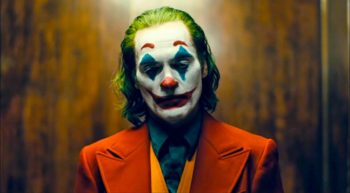
Image copyright: Warner Bros. Pictures, DC Films, and Joint Effort
Realism: This film will get the, er, “Speckie” award for realism. A story about a mentally ill guy who is downtrodden and oppressed and who flips a switch at some point into becoming a merciless killer certainly feels realistic. The movie spends a lot of time showing the Joker’s sufferings and makes him into the primary object of the audience’s feeling of sympathy for the protagonist.
However, in some ways the film offers a very good imitation of realism rather than realism itself. Can someone who has been beaten down in life and who has suffered “flip a switch” and become a cold-blooded killer? Er, actually it’s more common for someone with such emotional turmoil to become a hot-blooded killer, who kills in rage, or even one who positively enjoys killing. So the Joker’s cold-bloodedness in this film is not actually realistic, even though it feels realistic. And the fact that this Joker’s actions inspire widespread imitation is a stretch of realism and is more a reflection of how the society is portrayed in the film than anything strictly realistic. Plus, the fact that this version of the Joker escapes arrest is a bit unbelievable.
Origin: Since the entire movie, which really is more of a commentary on society than a superhero tale, is supposedly about the origin of the Joker, what it is that makes him who he is, you might also expect me to hand out a “Speckie” to Joker. But I won’t. As a story about some poor suffering guy who then turns bad, Joker pretty much works (with a few objections I’ve given in the paragraph above). But as a story for the origin of the super-villain “the Joker,” the film does poorly. Arthur Fleck is a dangerous man at the end of the film, not someone you’d want to accidentally splash with your car as you drove by–but he isn’t any kind of genius and certainly not a criminal genius. So as the origin story of the super-villain Joker, I judge Joker to be the worst origin story of the three we’re looking at.
Justification: Joker shows over and over again how powerless Arthur Fleck feels in life. His walk into evil comes because shooting people down gives him a sense of power. Though I would object that suffering actually makes some people more empathetic rather than less, it’s certainly true others take out their suffering on everyone else. The film Joker spends the most time establishing its justification for the Joker’s actions, thus is a strong contender for this “Speckie” I’m handing out. Still, because the film shows him becoming more of a cold-blooded killer than a passionate one (though we could say he is “coolly passionate”), I think the justification provided this character doesn’t quite match his actual actions. No Speckie.
Creepiness: The one and only scene with the Joker and Bruce Wayne together in Joker features Arthur Fleck reaching through the bars of the mansion gate and reaching for young Bruce Wayne’s mouth, inserting his fingers into the corners, and pushing the mouth into a smile. Very creepy. Among other creepy scenes. Yes, Heath Ledger’s Joker continually seeks to be disturbing, but due to the strength of Joaquin Phoenix’s acting, his Joker wins the Speckie for the creepiest portrayal.
Lethality: This version of the Joker shoots some people, totally without any detailed plan. And basically gets away with it multiple times. Yeah, real people do this often enough, but (thank God) they usually get caught. This “joker” would soon wind up in a prison or a mental institution. So while deadly, this joker is in a sense the least lethal of the three.
Leadership: The Joker in Joker is also by far the worst leader. In fact, while his actions inspire some imitation, the notion that this person could deliberately lead anyone to do anything would make the other two Jokers collapse into fits of laughter.
Film Message: Joker comes on strong with a message about the downtrodden and how we as a society should treat them better–lest, you know, general neglect of mental health services and men being super mean to other men they see as weak (as in genuine toxic masculinity) will cause lots of people to flip over to evil. The film also portrays wealthy people, including Thomas Wayne, Bruce Wayne’s father, as lacking empathy and in general causing regular people to suffer. A general revolt against the wealthy is a feature of this film. Does the film actually justify killing the rich or does it simply predict that if rich people remain as the movie portrays them, then “this is what you can expect”? I’m not sure–though I’d say the film can legitimately been seen either way.
Note how the death of Bruce Wayne’s parents right in front of young Bruce Wayne, such a key moment in the origin of Batman, becomes totally different in Joker. Instead of being the work of an inherently dangerous sociopath (1989’s Batman), the Waynes are shot during a general unrest inspired by the Joker’s actions in part but even more by how awful inequality is portrayed in the film and how terrible wealthy people are according to the story. So it’s almost a justified killing. Not justified as in, “killing people is okay,” but rather “what do you expect under the circumstances?”
This message, which supports the way a lot of people feel about our society, even though it has dubious moral value, is such a major feature of the Joker that I’m reluctantly handing it the Speckie for this category.
Evil Influence: Both inside and outside the story world, how much influence does this version of the Joker have?
In the story, for “reasons,” many people find his actions inspirational. A riot against the wealthy ensues. NOTE that criminal gangs and general lawlessness, a primary concern in the other movies this post looks at, is totally different in his film. There is no evidence of general lawlessness–just a response to oppression.
I’m more interested in the evil influence outside the story–could this tale put in someone’s mind that inequality and general nastiness on the part of some wealthy people justifies killing them? Actually, I think yes, the story could inspire someone to think that way. Though of course the vast majority of people who watch the film won’t think that at all.
And of course this movie contains “strong bloody violence, disturbing behavior, language and brief sexual images” as per its rating. Which isn’t that noteworthy nowadays in and of itself, but people strongly associate this kind of content with realism. Making it harder to realistically portray events without using these elements. Which I would call a minor evil influence.
In addition, this movie makes a perhaps-unintended commentary on the nature of evil–that evil comes from circumstances of dysfunction. That evil is a treatable mental condition, in effect. For me, this clearly fails to account for actual things people do and the reality of sin. So for that reason, I’m not giving my fictional “Speckie” award to Joker in this category.
Famous Real Evil Person Most Like: If we were to search public records of murderers, most likely we could find someone who matches Arthur Fleck better than the person I’m about to name. Which is appropriate in a way, because Joker functions better as a biography of some murderer you’ve never heard of than a story about someone infamous for super-villainy. But still, to make a comparison, I think I need need to pick someone famous, even if the comparison is flawed.
The Joker in Joker is most like John Wayne Gacy.
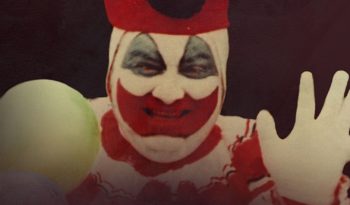
John Wayne Gacy in clown costume. Source: AP
For those who don’t recall the name, Gacy was a serial killer in the Chicago area who captured teenage boys and young men, had sex with them, tortured them and killed them, and buried them under his house. This happened in the 70s and he had 33 known victims.
As a sexual predator and serial killer, Gacy is inherently different from the Joker as portrayed by Joaquin Phoenix. Granted their differences, including Gacy having almost no known justification for the things he did, they do share some traits in common. Both are solitary killers who gained a degree of notoriety. Both worked as clowns, though Gacy did so as a volunteer and that was Arthur Fleck’s job. Both killed for strictly personal reasons. Neither had any master plan or deliberately lead any kind of movement. Both would be potentially very dangerous to a certain group of people, but not everyone (Arthur Fleck spares the life of a midget he’d worked with, even as he callously murdered another former colleague right in front of him).
The most important point of this comparison is to show that even though Joker portrays someone who becomes villainous, he is no leader, no criminal mastermind. Just dangerous to the wrong person who runs into him at the wrong time. Like John Wayne Gacy.
The Joker in Tim Burton’s Batman
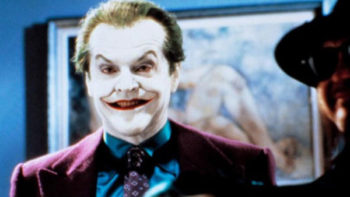
The Joker as an art lover and leader. Image copyright: Warner Brothers and DC Comics.
Realism: While in some aspects I think the Joker in Batman does parallel real-life people, the overall tenor of this movie is not realistic and the portrayal of the Joker in some aspects doesn’t even try to be realistic. The Joker is a larger-than-life figure, that’s how Batman shows him. Lots of details are not realistic at all, including the vat of chemicals Jack Napier falling into supposedly permanently damaging the nerves to his mouth (but no other nerves), the giant pistol the Joker uses to shoot down the Batwing, the impossible heights of the Gotham Cathedral, etc. etc. So as a realistic portrayal, this film comes at the bottom of the list.
Origin: As the origin of a super-villain, starting with someone who is already an important figure in organized crime and pushing him a bit further is a good start. In terms of explaining his origins, it was also good to place him as the killer of Bruce Wayne’s parents, showing him to be someone who was always a sociopath. He just got worse when he “lost his mind.” But the story falls down when saying it was a plunge into chemicals and having his appearance altered as a result that put him over the edge. There’s no psychological depth there. So no Speckie for Jack Nicholson.
Justification: Jack Nicholson’s Joker is a crime boss first and foremost. He is going for wealth, luxury, beautiful women (though in his most creepy moment, he deliberately mutilates his lovers) and in general trying to make money off crime. A totally normal justification–though when you look at this random killings through the chemicals he distributes to the public, which he launches into after making himself the new crime boss, his reasons may seem to fall down into the cartoonish. But the story articulates a reason for him–he considers death a form of art. While the reason is weird, he has a reason that makes sense within the context of the story world.
And given the truly strange things people have praised as art, this justification strikes at a fear that creators will build something dangerous, consequences be damned. That someone will love their creation to the degree they lose sight of the effect it can have–they don’t care about hurting people, they just want to follow their own creative impulses, with no restrictions. Certainly this fear of creativity-without-restrictions is based on a realistic reaction to many human inventions. So I give the “Speckie” for best Joker in this category to Jack Nicholson.
Creepiness: This version of the Joker is the least creepy of the three. Though he does have several creepy moments, including his deliberate mutilation of the faces of his paramours.
Lethality: While this Joker is certainly responsible for the deaths of many people, in person he’s not much of fighter. He kills mostly through actions he plans and has others carry out. Lethal, yes, but no Speckie for this Joker.
Leadership: On the other hand, this Joker is by far the best leader of the three. Arthur Fleck in Joker not only has no leadership skills, he has nobody directly serving under his command. Heath Ledger’s Joker, who is a leader, but who continually and casually sacrifices his own men, inspires thoughts of “why does anyone ever actually follow this clown?” (“pun” intended). Nicholson’s Joker may have horrifically random plans for the public at large, but his troops serve him because he give them reasons to do so–loyalty in exchange for loyalty. Speckie awarded!
Film Message: Unlike Joker, in which the message of the story permeates the film and parsing out exactly what that message means is probably one of the main reasons Joker has been nominated for “Best Picture,” the 1989 version of Batman was low on deliberate messages. Still, simply by portraying one character as the hero and another as the villain, the movie has a message about the nature of Good and Evil. First, that such categories actually exist. Second, that one of the most important defining characteristics of evil is to lack empathy for others–one of this Joker’s prime characteristics. (In fact, that’s the message that laughing at the distress of others sends more than any other–that I feel no empathy for you.) I happen to like this message better than what Joker offers, but because the message is apparently accidental and very similar to the message behind The Dark Knight, no Speckie will be awarded here.
Evil Influence: In the movie, the Joker encourages his troops to engage in a certain measure of zany criminality. Sure, he influences them to do things they otherwise would not do, but his influence on others isn’t really what this film is about.
As for real-world potential to inspire evil, the idea that evil is cool and good is boring might worm its way into a viewer’s mind from this film. Because Batman is dark and brooding and good, while the Joker is fun and happy and evil. Though I actually am more concerned with people who believe happiness is a characteristic of being good, inherently part of the package of goodness, which it isn’t necessarily (as most versions of Batman show).
So overall, this film neither portrays, nor in fact is responsible for much noteworthy in terms of “evil influence.” (No Speckie!)
Famous Real Evil Person Most Like: Again, as a comparison, the person I’m about to name fails in a number of ways to completely match the Joker in Batman, but I feel better about this analogy than I did comparing Arthur Fleck to John Wayne Gacy. Who among historical figures that come to mind saw himself as an artist over his entire lifetime? Who was more noteworthy for his leadership and ability to inspire others than anything else? Who followed a vision for the world that meant good things for his followers, but death and destruction for those “not on his team”? Who had a vision for the future? Who used poison chemicals to destroy people?
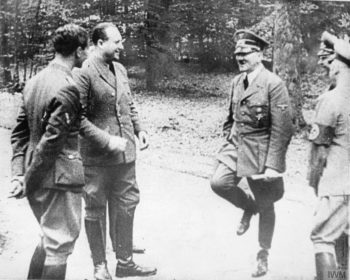
An uncharacteristically happy Hitler (after France surrendered)
The Joker in Batman is like most like Hitler.
“But Hitler wasn’t funny at all!” you may object. True, but that wasn’t the aspect I was comparing. “But the Joker didn’t kill nearly as many people as Hilter!” True, but Hilter headed up an entire nation with a much greater capacity to kill than Gotham City gangs had. This version of the Joker, if he had all power, would have most likely have “artistically” killed millions. “But the Joker is nowhere near as hateful as Hitler was!” True–and a very significant difference. Hitler was highly emotional and hateful and the Joker simply thought killing was funny, mostly emotionally detached as he killed. Still, I don’t think killing-even-though-you-hate-less makes the Joker’s intentions benign. “But Hitler was much more evil!”
Well, yes, I agree Hitler was more evil–certainly the Joker in Batman showed no lust for genocide. But John Wayne Gacy, driven by sexual lust, was also more evil than Arthur Fleck. The point of comparison is not to say the characters are the same in their effect or power, but that there are similarities in motivations and methods of operations. Der Führer was dangerous not because he personally was a killer, but because of what he led others to do for their own benefit, at the detriment of others. Like Jack Nicholson’s Joker.
The Joker in The Dark Knight
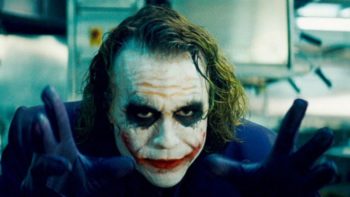
Image copyright: Warner Brothers and DC Comics.
Realism: The Dark Knight cast off the more cartoon-ish elements of Batman, striving to adopt a more realistic feel. Yet in some ways it’s not like ordinary reality at all. The Joker has a horde of followers who are completely reliable but also completely expendable–not a realistic thing. Batman gets chased by the police to salvage the reputation of Harvey Dent–hey, why does that make any sense at all? (I mean, if there’s gonna be a cover-up, why not say crime bosses killed each other?) Plus, some physics things I won’t delve into. Suffice it to summarize that The Dark Knight is only moderately realistic.
Origin: The Dark Knight does not portray the origin of the Joker. He simply shows up on the scene, all kitted up and ready to go. A few times he talks about how he got the scars on his face. There’s an implication at one moment he was a victim of abuse, but later it becomes clear that he was lying. His lack of clear origin makes him more mysterious, more frightening. So in a surprise move, I’m giving the “best super-villain origin” award to the version of the Joker that actually contains no origin story! (“I’m so surprised, but proud, to have received the Speckie award in this category…” 🙂 ) Though this contains an editorial comment on my part–evil doesn’t need to be explained nearly as much as good does. (Do we have a solid case of abuses and slights that made John Wayne Gacy who he was? Or Hilter who he was? Not really–only a little of that kind of thing happened to them.)
Justification: The Joker in The Dark Knight has no clear justification for his actions. “Some men just want to watch the world burn,” Michael Cane’s Alfred explains to Batman. Some people will find this unrealistic–but that’s because they are hook, line, and sinker buying into the idea that human evil is aberrant and requires some special origin story to explain it. Actually, some humans from infancy show no sign of empathy for others. Some humans really do kill and engage in mayhem for no clear reason. And most humans, as both studies and history have shown, will participate in evil if an authority figure is telling them to do so. People are not usually devoid of empathy, but people much more easily accept evil than the evil-is-mental-pathology view allows for. Still, I already gave out a “Speckie” for the no-origin origin. I won’t double down with a no-justification justification.
Creepiness: Yeah, Heath Ledger’s Joker is pretty creepy on multiple occasions. It’s a tribute to Joaquin Phoneix’s tremendous acting that Arthur Fleck manages to be an empathetic figure we pity most of the time, while at particular moments out-creeping Heath Ledger’s Joker. The Dark Knight’s Joker is more consistently creepy, but I already gave the Speckie to Joker–Arthur Fleck–Joaquin Phoenix.
Lethality: Both in personal, physical actions and by nefarious plans, this Joker is the most lethal of the three. SPECKIE winner!
Leadership: While this Joker is awfully good at coming up with detailed plans–unlike Arthur Fleck–I really wonder how he gets anyone to follow him. Any observant subordinate would quickly realize how bad this Joker’s plans go for his foot soldiers and would not want to participate. The only way his followers make sense is if they are trapped on his team, with no way to escape it. More on that in a bit, but still, while this Joker is a leader, he isn’t one you can imagine a normal person following. No Speckie here.
Film Message: This movie does get message-y at times. Of course it resonates in harmony with 1989’s Batman that there really are categories of Good and Evil and that Evil needs to be resisted. Very true. This movie does even better and makes it clear that resisting evil doesn’t necessarily have to do with physical victory in a fight. The two boatloads of people, each rigged with explosives, each with a controller to blow up the other ship, was about tempting people to do harm to others–resisting the evil at that moment was found not in a physical fight but in refusing to play along with the evil plan. By deciding to be good, even at the risk of their own lives.
The idea is that being Good is not just about fighting bad people trying to kill others, but is more importantly about resisting Evil in yourself. That’s a message I heartily approve of. I like this message much more than what’s found in either of the other films.
However, I felt the message got muddled by declaring that if only people knew Harvey Dent had done wrong that would do some kind of horrific damage to the morale of people in Gotham City. Yes, people can get hurt when they learn of someone they thought of as a paragon of virtue has fallen into shameful behavior. But the problem there, I would say, is expecting any real person to be a paragon. Paragons are best found in fiction, where they can model what their creator thinks is ideal behavior for you to imitate if you chose. But real people would be better served by recognizing other real people are capable of doing wrong you’d never expect.
Besides, as much as I find the message of Joker to be morally troubling, Joker handled it’s message more artfully than The Dark Knight, in which “the message” was mostly made known through impassioned speeches. Artistically there’s a lot to be said for showing the message through actions, rather than through things directly said (though directness is at times appropriate–it depends on the audience).
Evil Influence: This Joker is all about evil influence! However he manages to get his followers to obey his orders to their deaths, he does. Yet his central premise is to get people most other people see as good to do things most of us see as evil. He wants people to choose to blow other people up–to pick one family member over others–to despair that anything good can happen in the future. To accept the idea that it is society that’s profoundly dysfunctional in loving plans, not him for destroying them. That breaking people and wending them to his will is what he was put on Planet Earth to do. That if Batman has one thing he won’t do, that’s the very thing the Joker wants him to do.
How about real-world potential for promotion of evil? The movie does rather normalize extreme violence, though it consistently portrays such violence as bad. The movie does casually embrace the idea that lying to the public is a good idea–covering up Harvey Dent’s fall into insanity is a good thing. Because the public can’t handle truth. Such a notion isn’t particularly supportive of the morality of truth-telling. We could say the Heath Ledger’s Joker glamorized evil by being more interesting than Christian Bale’s Batman. Perhaps The Dark Knight even significantly helped inspire the interest in the Joker as his own character that’s given us the current Joker movie.
But overall, because The Dark Knight primarily conceives of the Joker as an evil influence on others, seeking to prod them to do wrong, therefore I give this portrayal the Speckie-award-I-invented-for-this-post. (YAY!)
Famous Real Evil Person Most Like: Please excuse me for veering from using a human person as my example here. But when we are talking about someone who is seeking to destroy and ruin, someone whose backstory we don’t know very much about, someone primarily interested in prodding good people to do evil things, who is openly cynical about people ever sincerely doing right, who has a horde of insane but also insanely loyal followers, who is negatively focused on destruction of good rather than any form of creative vision, all of that paints a picture of a particular person.
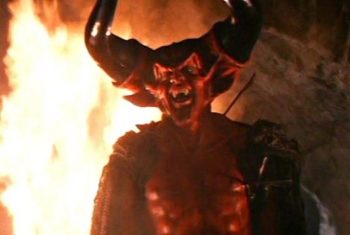
“The Darkness” from the movie Legend. Who did you think it was? 😉 Copyright: Universal Pictures
The Joker in The Dark Knight is most like Satan.
Granted Satan works almost exclusively behind the scenes, cannot be punched in the face or killed by any human means, has an influence much broader than Gotham City, and generally only inspires people to kill others, rather than directly killing himself. But still, as one with no empathy for human suffering, no desire to build or obtain or create, who seeks to put good people in situations what will cause them to become evil, this version of the Joker is very much like Satan as portrayed in the Bible (discussed in a previous post here).
Conclusion
So with eight made-up “Speckie” awards to give out, the “Travis Perry Academy” assigned 3 Speckies to the Joker in Joker, 3 to the Joker in The Dark Knight, with only two going to the Joker in Batman. What does that count really mean, since I both made up the categories and judged them?
It means I think the Joker is a character worth thinking about and writing about. I think the Joker film is very interesting and has some strong points. But it also has weak points, most notably how it fails to explain the origin of a super-villain. And has a muddled and potentially sinister “kill the rich” message embedded within it.
It means that while I consider Joaquin Phoenix’s Joker to be memorable, his portrayal was no greater than Heath Ledger’s, simply different. Though both performances were in some limited ways less impressive than what Jack Nicholson and Tim Burton did with the character.
I think Joaquin Phoenix deserves an award for best actor. But best picture? Best director? Best screenplay? No, I don’t think so.
So what do you think about the Joker as a character? Any comments on my analysis? Any particular thoughts about Joker the movie? Or other examples of the Joker as a character?

































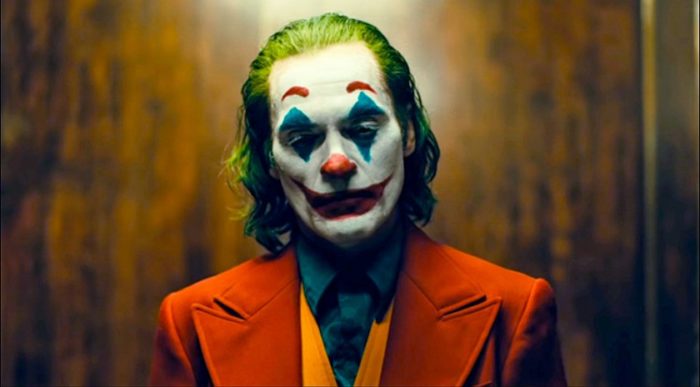


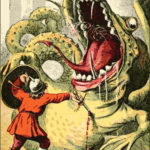




What I didn’t say in my post is I put the Jokers in order from lesser to greater evil, based on my estimation of their character. Which is not the same as my estimation of the moral influence of the movies they came from, which would probably be the opposite.
But the post was already getting LONG so I’m adding that thought as a comment.
Once when I was falling down the yootoob hole, I watched a few vidyas about how psychopaths are born, but sociopaths (and narcissists) are made. That seems to be the wrench in the gears for Joaquin Joker, because Joker seems to be cast in a psychopath mold and therefore a sociopath backstory doesn’t fit. And also, that’s not how sociopaths are made anyway.
I’ve heard some criticism for Joker as being Incel Campus Shooter Manifesto: The Movie. And yeah, pretty much.
Tho its debatable if Hitler was all that effective as a leader. I’ve heard arguments that he was a convenient shouty figurehead while the real brains like Goring pulled the strings.
I think the Joaquin Joker shows a number of different traits that don’t necessarily go together. Again, while I can easily see this character becoming a killer, he’s the type who would have been caught in a couple of days. The Joaquin Joker is no criminal mastermind.
And yeah, I certainly see aspects of the Incel Campus Shooter Manifesto in Joker. It can be taken another way though–as a call to be kinder and nicer to suffering people. That’s how the Academy Awards types who nominated it for Best Picture are thinking, most likely. But it has the sinister underbelly, too. (In my opinion, so do a lot of other films, actually. This one is just a bit more obvious than some others.)
As for HItler, I read a book called The Last Days of Hitler (an early history on him and a big contributor to the debate you mention) which argued that Hitler’s inner circle was a mess of inner strife and conflict and a tremendous lack of real leadership. Historians do universally agree that Hitler’s leadership went downhill over time.
But there’s been a great deal of pushback on the idea that Hitler was a crap leader from day one. A lot of the early successful ideas in the war directly came from him. And he also had detailed visions of what he wanted to see in German architecture and a number of other things–like coming up with the idea for the Autobahn. Yeah, he was delusional and the end it tremendously contributed to his own downfall.
But at the very least, Hitler was able to persuade people to follow him. He pushed the right buttons. And that’s something not everyone can do–but at least one version of the Joker managed to make it look convincing, at least to me.
…sociopath does not = narcissist. Sociopaths ARE usually narcissists, but a narcissist is not a sociopath. Just… for clarity sake. Sociopathy is a personality disorder. Which can be genetic. But yes, a sociopath is different from a psychopath.
I thought Travis was just going to say that the real killer that each one of the joker’s was like is Joaquin himself (that was a joke). Seriously though. That guy makes me uncomfortable.
The Dark Knight is probably my favorite out of these. When it comes to the subordinates, I figured they followed Joker out of fear, or because they didn’t realize he was that horrible until they were too far in to escape easily. Or they’re so intent on money and power that they’re willing to take on more risk just to get it.
But the overall style of the movie is one I like, along with its exploration of psychology and strategy. I heard someone say that the Joker in this film was supposed to represent evil itself, and that evil isn’t something that needs to be explained or understood, simply fought. In a general sense that’s true, the problem is that people have a hard time judging what’s evil, or whether they’re fighting the right way. Like, in the first film you mentioned, it sounds like a lot of people decided that rich people were evil and that beating/killing them was how they should fight that evil.
For a real life example…psychopaths(as in someone with Antisocial Personality Disorder) or Narcissists(someone with Narcissistic Personality Disorder, NOT someone that’s simply arrogant) are probably the closest to being truly evil. They truly are incapable of caring about other people and are generally very dangerous in some way or another. Supposedly, most don’t become serial killers, but they are abusive to those around them. It’s mindblowing how horrifically they can treat their spouse or children.
So many might say that standing against that evil means diagnosing people with those disorders and putting them in jail where they can’t hurt anyone. The problem is that diagnosis is difficult and people easily label others as Narcissists or Psychopaths simply because they perceive them negatively. Like, maybe the person scares or unsettles them in some way. Or maybe the person is behaving in a bad or threatening manner, but people mistake the reasons behind the behavior. Supposedly, alcoholics or drug addicts can act like Narcissists or Psychopaths.
A great example of misdiagnosis comes from a video I saw where a YouTuber discussed why she thought Darkstalker from the Wings of Fire series was a psychopath. Darkstalker was manipulative and power hungry, and did a lot of destructive things, but ironically the reasons behind his destructive behaviors are proof that he isn’t a psychopath at all.
Darkstalker truly loved many people in his life, such as his mother, sister, girlfriend, and, on a general basis, his tribe. He was born with a lot of power, such as the ability to see the future, read minds, and use animus magic. Right from the start, that meant he knew all the hateful thoughts in his father’s head, and saw many future possibilities of his father(Arctic) betraying/harming his family. Darkstalker always lived in an angry defensive mode because of this. Not only did Arctic pose a threat to Darkstalker himself, but also those Darkstalker loved most(his mother and sister). There were many subtle clues to Darkstaller feeling protective in those instances. If I recall correctly, Darkstalker expressed frustration that his parents fought where his little sister(Whiteout) could hear them. He also hated how his father seemed proud of Whiteout and showed her off in public, but then seemed not to care about her when they were at home.
One of the few points of relief Darkstalker had from all this was his girlfriend, Clearsight. He could see the future and therefore always looked forward to meeting her. Clearsight was sort of his ray of hope in all his misery. If he were a psychopath, he would not have been able to find genuine joy in the idea of loving/being loved by someone. The reason he was so manipulative toward her later on was because he was trying to keep his goal of attaining power while ALSO trying to make sure she still loved him.
Was Darkstalker’s behavior right? No, of course not, and he definitely needed to be stopped. But if the right circumstances came about, he would have changed and become an amazing person(well, ok, dragon) over time. He acted the way he did because he was emotionally compromised and got too consumed in his own goals. But as the series progressed, he showed signs of questioning himself in a way that would lead to change. The tragic part of his story was that he had so much power that people couldn’t wait for him to come around. They had to find ways to contain him before he controlled/destroyed everything.
From a psychological standpoint, his story is pretty realistic for the most part(minus the fantasy elements like dragons and magic type stuff)
Psychopaths and narcissists can’t love/care. But Darkstalker did care. A lot. The person making the video accusing him of psychopathy kinda mentioned that, but brushed it off as him being ‘on the spectrum’ of psychopathy instead of him simply being a normal being that was just in a bad patch in life. People don’t understand the idea of all consuming pervasiveness when it comes to diagnosing personality disorders. Darkstalker would have had a VERY different story if he was a psychopath. He would not have felt or behaved the way he did and would have had no capacity to ‘see the light’ and become good again(which, as I mentioned, he sort of started to do in later books)
So that shows how easy misdiagnosis is. Someone can simply take things like destructive tendencies and what LOOKS like insensitivity and say the person is a psychopath when they’re anything but.
In many ways, Darkstalker was actually reacting out of the desire to protect, or gain justice for everything wrong in his life. But maybe that just shows how bad angry justice oriented behavior actually is. Even when it comes from good intentions, it often makes someone look like a monster even if they actually aren’t one.
Yeah I think your comments on comparing Darkstalker to Joaquin Phoenix’s Joker clarify a few points I was trying to make. In the end, in one scene in particular, the Joker acts as if he is incapable of feeling empathy in Joker. But the rest of the film shows he’s very capable of feeling empathy.
Does it happen that people have been so abused they start lashing out at people and even killing them? Yes. But that doesn’t make a person incapable of perceiving or understanding someone else’s fear. Which what happened in one scene in Joker, in which the Joker murders one ex-co-worker in front of another (who is a midget) and can’t even perceive that the midget would find that disturbing. Which is how a psychopath would act.
But the rest of the movie makes it clear the Joker is not a psychopath. So I would say the movie failed to be fully realistic in its portrayal.
Hm…well, I wasn’t quite trying to make a comparison between Darkstalker and the Joker, moreso just trying to point out how people misinterpret and misdiagnose others’ behavior. There’s some comparisons between the two of them, such as having endured extreme amounts of emotional distress and maybe wanting to be entertaining sometimes or something. But from what I can tell from the previews of Joaquin’s Joker, his underlying personality is vastly different from Darkstalker’s, as are his exact circumstances and motives.
Exactly how people respond to abuse is complicated, because there’s so many circumstantial and personality type factors that can play in. Extreme abuse throughout early childhood can make someone develop Narcissistic Personality Disorder. But usually that’s due to certain types of abuse that prevent the child from feeling like he can form his own identity. On one hand, that can be a parent spoiling and idealizing a child too much and not letting them ever have freedom or do things themselves. Or, it can be treating them heinously and playing mindgames whenever the child tries to behave and think separately from the parent. But, supposedly, there can be many kids raised under the same roof by the same parents and exposed to very similar types of abuse, yet only one or two of those children develop NPD. Other children may develop something like toxic levels of co-dependency.
When discussing Narcissism and Psychopathy, though, there’s two types of ’empathy’ at play. One is Cognitive/cold empathy, which is where someone can look at another person and understand what they’re thinking and feeling. Like, they ‘know’ that the other person is sad or angry, but it might not cause an emotional reaction inside the person with cold empathy. Warm empathy is more like when someone not only knows what the other person feels, but has an emotional reaction to it and is more likely to care. Technically the average person is going to have varying levels of both types of empathy. But it seems like Psychopaths and perhaps Narcissists only work with a certain brand of cold empathy.
Thing is, though, neither type of empathy is inherently bad. The problem is how people actually act on those types of empathy. Feeling other people’s emotions definitely doesn’t translate into treating them well. In fact, it can be worse because a person with higher levels of empathy can behave a little sadistically and enjoy causing negative emotions in others. It’s easier for people to enjoy things that they can sense, after all.
But empathy and sympathy are tricky. People will only feel those things for certain people. Or, they will ignore those feelings if they think they need to mete out justice to someone that deserves it. I haven’t seen Joker and thus don’t have an opinion on how it was portrayed in the movie, but empathetic people don’t always look empathetic.
I’m affirming, whether the director or actor intended it or not, that in the scene I’m referencing, the Joker demonstrated a complete lack of empathy of any kind to the midget’s fear, either cold or warm. Which certainly isn’t just a normal consequence of his rough life making him more callous.
If you see it yourself you may disagree with me. Or perhaps not.
This relates to Darkstalker because you said some people read characters wrong–my assertion in the case of Joker is in essence that I am not reading him wrong. His creators created him wrong–as in, unrealistically. In my opinion. At least partially.
As for The Dark Knight, it’s a movie I like a lot better than Joker both in terms of its gripping action and its message about resisting evil. But I think the entire Two Face element of the story doesn’t really work and it makes no sense to me at all to pin the killing of mob bosses on Batman–along with some other egregious plot holes.
Joker, in spite of me seeing it as messing up part of the emotional content of Arthur Fleck’s actions and a few improbabilities like him never getting arrested AND also the fact this movie does not really portray a super-villain, in spite of those things it holds together better in terms of making sense than The Dark Knight does.
As for TDK Joker representing evil itself, I have no trouble with that interpretation. But if one holds evil to be completely aberrant to human beings, then all cases of evil have to be explained. But most real-world cases of evil, as in infamous murderers and evil dictators, defy easy explanation. Some people complicit in mass murder are fun-loving, pleasant people (Herman Goering in WWII). Some are not. Many suffered hardship, but so do lots of other people, and there is no direct correlation between people who are the most abused and the most terrifying killers (though abused people often enough commit murders, they usually do so in a way that they get caught).
The most common kind of human evil is to create a justification for yourself to act a certain way but condemn the same actions in others. At its worst, this mindset can make a person feel they’re correct in killing other people or even committing genocide.
Over time, a person who justifies their actions can overcome the natural revulsion of murder, though that’s not the same as being a psychopath.
Some people, in particular authors, believe showing evil characters justifying themselves in performance of evil is absolutely necessary for a realistic portrayal of evil. That is, “everyone is the hero of their own story.” But that’s not true!
Some people see themselves as evil but feel compelled to act as they do anyway. That’s how Jeffrey Dahmer described himself. Some people similarly generally recognize they are bad (like a gang member I spoke to in juvenile detention once), though they kinda downplay it, but don’t want to stop because they like the benefits of power, sex, and wealth. Not everyone sees himself or herself as good!
So it’s just not necessarily, either medically or in terms of justification, that all villains have their motivations explained.
I haven’t exactly rushed out to see the new Joker movie because it hasn’t interested me much. The preview I did see didn’t impress me, and it just doesn’t feel like it stays true to the essence of Batman and Joker. Like, there’s many different versions of Batman and Joker, and that’s fine, but there’s several core factors to their characters that just don’t seem present in Joaquin’s Joker. At least based on first impression and from what you’ve said. I wouldn’t mind seeing it some day, but those are some reasons why I kind of agree with some of your assessments of that show and why I haven’t been eager to watch it.
It’s been a long time since I’ve seen The Dark Knight, so I’m hesitant to say whether I think certain elements make sense or not. But it seems like the TDK was built to represent concepts and ideas more than an exact representation of reality.
I definitely agree that not everyone views themselves as good or that people will know how to explain their actions. There are whys and hows to everything, though. Honestly, a lot of things make a ton more sense in terms of personality type. Not the vague stuff that Enneagram and Myers Briggs tests talk about, but from in depth look at cognitive functions and such. People say that everyone is an individual, but they still don’t understand how people can react in completely different ways to the same stimulus.
I was listening to C S Joseph talk about one of his friends(an INTP I think. I’d have to check for sure). The INTP recounted a time in his childhood where his brother broke a window in the house, and when their dad got home, the brother pinned blame on the INTP. The father believed the false accusation and thus spanked the INTP. So the INTP got mad, broke a different window, and said ‘If I’m going to do the time, I may as well do the crime.’
That’s very interesting to me, because as an INTJ, I’d be way less likely to have that reaction. If I was a little kid in that situation I would have been more likely to argue and yell and try to convince the other person of my innocence. And a constant inability to convince others of my innocence would cause me to withdraw and feel like I can’t trust anyone to do simple things like be fair. INTJs CAN say things in the spirit of ‘if I’m going to do the time, I may as well do the crime’, but it’s usually more of a rhetorical device than a natural way of venting their anger. But then personality isn’t the only determinant of behavior. Circumstances and upbringing intertwine very heavily with that. And of course some other psychological things like Bipolar Disorder, Autism, etc. may be involved(I’m not saying that those cause violent actions, just that they affect behavior in general).
Final thought on your comment–some people positively enjoy making other people suffer and I would say that is worse than being devoid of empathy. So psychopaths are not necessarily the worst, but they tend to be.
Though I’ve seen research that there are high-functioning psychopaths who feel no empathy but for some reason don’t hurt anyone.
Since based on what I just said, psychopathy doesn’t equal evil in a one to one way, trying to treat psychopathy would be more a preventative strike to prevent evil. Some people though may feel that their work in fighting effects of medical conditions amounts to a battle of good verses evil. But I imagine generally not. Most people in mental health professions talk about making sick people well, not good and evil.
Off on a tangent from what I just said a bit, but I remember touring an Explosive Ordinance Disposal training facility in Afghanistan and the though crossed my mind that the place was like a fantasy “fortress of light.” Everything the EOD guys do is for the purpose of risk their lives to save other lives.
But that’s not necessarily how they see themselves….
From what I’ve seen, there’s a lot that can be said about high functioning psychopaths. Some of those might actually be normal people that were misdiagnosed. Others actually are psychopaths but they were raised in a way that was a little friendlier and made them less inclined to hurt others. Or, they learned that harming others hinders their survival and goals. But, when we say ‘hurt’ in this case, it’s easy to say that in the sense that high functioning psychopaths aren’t serial killers or even physically abusive to their family. But there’s still a lot of times when they can be mentally abusive and such.
As far as how necessary it is to understand someone, that depends. Obviously if someone attacks with the intent to kill, that’s a situation that requires defense, not an understanding of where that person is coming from. But, outside the context of emergency self defense, understanding the person can be very vital from the standpoint of healing them/making them become a better person, that way we aren’t harming someone that could have otherwise been saved. Or, understanding can help us know how to prevent the worst atrocities from occurring in the first place.
Sam Vaknin is dual diagnosed as a Narcissist and Psychopath and is probably a good example of one that doesn’t seem to hurt people. He learned that controlling his urges and obtaining Narcissistic Supply by being a famous researcher is a way to get what he wants without any detriment to himself. But there’s still definite signs that he’s not a great person. From some of the things he said, he wouldn’t mind abusing his wife if he wasn’t satisfied with the Narcissistic Supply she gives him. He’s been pioneering what seems to be a sort of cure for Narcissism called Cold Therapy. It doesn’t sound like it would take the Narcissism away entirely, but at least reduce the worst traits so that they aren’t destructive anymore. He says that Cold Therapy could potentially work for other illnesses, too.
That said, even if he has a lot of good information, everything he says has to be taken with a grain of salt. Sometimes he seems to go crazy labeling everyone under the sun as a Narcissist when they really aren’t. But one has to remember that, as a Narcopath, he doesn’t entirely know what it’s like to be an average person, and being able to label people would feed his ego.
A lack of emotional empathy is not necessarily evil. You can choose to help a stranger you have no emotional bond with just because it’s the right thing to do. And feeling empathy does not always lead to just or moral behavior. A lot of “angel of death” doctors see themselves as kindly people who kill out of compassion. (Sometimes they ignore the wishes of those they see as mentally incompetent but it’s done out of the emotion of pity.)
Agreed.
I haven’t seen Joker. But depicting something does NOT mean you’re advocating it. Oedipus Rex did not advocate patricide and incest though the protagonist committed both.
Some critics argue Joker really isn’t about the Batman villain at all. The character is incapable of committing such crimes and organizing a gang of loyal followers because it’s all a delusion going on in his head. He is leading a fantasy life as a comic book super villain to cope with his feelings of being a pathetic loser. Kind of like the movie Fight Club but angrier.
One interpretation anyhow.
I prefer to think that about the Joakim Phoenix movie. Jack Nicholson will always be the Joker for me. Villains should not be too sympathetic unless you are aiming for the redemptive arc narrative.
I wish we had more heroes. I’m not blaming any one movie in particular but we’ve become too obsessed with evil as a culture.
We need more stories along the lines of Les Miserables. Though not necessarily musicals.